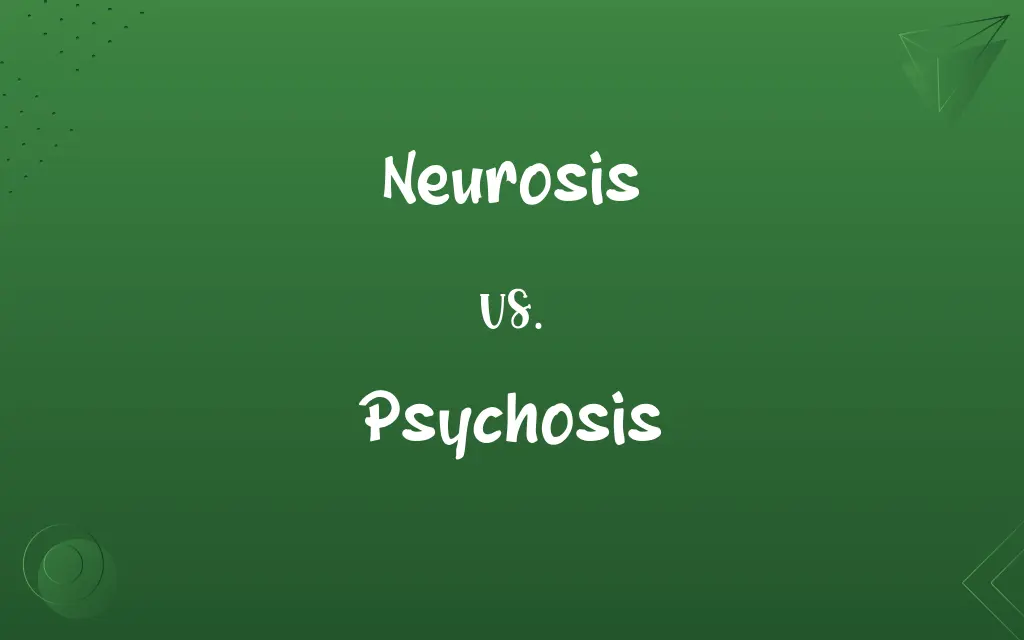Neurosis vs. Psychosis: Know the Difference

By Shumaila Saeed || Published on February 7, 2024
Neurosis is a mild mental disorder causing stress without loss of touch with reality, whereas psychosis is a severe condition involving a disconnection from reality.

Key Differences
Neurosis encompasses mental health issues that don't involve losing touch with reality, like anxiety or depression. Psychosis, however, is characterized by a significant break from reality, as seen in schizophrenia or bipolar disorder.
Shumaila Saeed
Feb 07, 2024
Individuals with neurosis are often aware of their condition and its impact on their lives. In contrast, those experiencing psychosis may have hallucinations or delusions and often lack insight into their condition.
Shumaila Saeed
Feb 07, 2024
Neurosis can affect daily functioning but doesn’t usually lead to a complete disconnection from reality. Psychosis, however, can severely impair a person's ability to perceive, think, and relate to others.
Shumaila Saeed
Feb 07, 2024
Neurosis is typically treated with therapy, counseling, and sometimes medication. Psychosis often requires more intensive treatment, including antipsychotic medications and hospitalization in severe cases.
Shumaila Saeed
Feb 07, 2024
Neurosis may be caused by stress, trauma, or imbalances in neurotransmitters. Psychosis can stem from genetic factors, brain chemistry imbalances, or as part of another mental illness.
Shumaila Saeed
Feb 07, 2024
ADVERTISEMENT
Comparison Chart
Reality Perception
Maintains a grip on reality.
Involves a loss of contact with reality.
Shumaila Saeed
Feb 07, 2024
Awareness of Illness
Often aware of their condition.
May not recognize their altered state of mind.
Shumaila Saeed
Feb 07, 2024
Symptom Severity
Symptoms are less severe.
Symptoms are more severe and disruptive.
Shumaila Saeed
Feb 07, 2024
Treatment
Therapy, counseling, some medication.
Antipsychotics, intensive therapy, hospitalization.
Shumaila Saeed
Feb 07, 2024
Daily Functioning
Can function in daily life, albeit with stress.
Daily functioning can be significantly impaired.
Shumaila Saeed
Feb 07, 2024
ADVERTISEMENT
Neurosis and Psychosis Definitions
Neurosis
Neurosis involves emotional distress and anxiety without psychosis.
She was diagnosed with neurosis due to her constant, unfounded worries.
Shumaila Saeed
Jan 11, 2024
Psychosis
Psychosis involves delusions, hallucinations, and impaired thought processes.
He experienced psychosis, believing in things that weren't real.
Shumaila Saeed
Jan 11, 2024
Neurosis
Neurosis is a psychological condition marked by chronic distress.
His obsessive-compulsive behavior was a form of neurosis.
Shumaila Saeed
Jan 11, 2024
Psychosis
Psychosis is a mental disorder characterized by a disconnection from reality.
Schizophrenia is a form of psychosis with symptoms like hallucinations.
Shumaila Saeed
Jan 11, 2024
Neurosis
Neurosis refers to a range of psychological problems not involving delusions or hallucinations.
Neurotic depression is characterized by persistent feelings of sadness and hopelessness.
Shumaila Saeed
Jan 11, 2024
ADVERTISEMENT
Psychosis
Psychosis is often treated with antipsychotic medication and therapy.
His psychosis improved significantly after starting antipsychotic treatment.
Shumaila Saeed
Jan 11, 2024
Neurosis
Neurosis is a mild mental disorder affecting mood and behavior.
Phobias are a type of neurosis that can disrupt daily life.
Shumaila Saeed
Jan 11, 2024
Psychosis
Psychosis affects a person's ability to think, respond emotionally, and behave appropriately.
In her state of psychosis, she couldn't differentiate between reality and imagination.
Shumaila Saeed
Jan 11, 2024
Neurosis
A mild mental disorder characterized by excessive anxiety, insecurity, or obsession, usually compensated for by various defense mechanisms.
Shumaila Saeed
Jan 11, 2024
Psychosis
Psychosis can be a symptom of severe mental illness or a result of substance abuse.
Methamphetamine use can lead to drug-induced psychosis.
Shumaila Saeed
Jan 11, 2024
Neurosis
(pathology) A mental disorder, less severe than psychosis, marked by anxiety or fear which differ from normal measures by their intensity, which disorder results from a failure to compromise or properly adjust during the developmental stages of life, between normal human instinctual impulses and the demands of human society.
Shumaila Saeed
Jan 11, 2024
Psychosis
An acute or chronic mental state marked by loss of contact with reality, disorganized speech and behavior, and often hallucinations or delusions, seen in certain mental illnesses, such as schizophrenia, and other medical disorders.
Shumaila Saeed
Jan 11, 2024
Neurosis
A functional nervous affection or disease, that is, a disease of the nerves without any appreciable change of nerve structure.
Shumaila Saeed
Jan 11, 2024
Psychosis
(psychology) A severe mental disorder, sometimes with physical damage to the brain, marked by a deranged personality and a distorted view of reality.
Shumaila Saeed
Jan 11, 2024
Neurosis
A mental or emotional disorder that affects only part of the personality, and involves less distorted perceptions of reality than a psychosis. As used in medicine, anxiety is a prominent characteristic, and the condition may be accompanied by psychosomatic symptoms. Phobias and compulsive behavior are common varieties.
Shumaila Saeed
Jan 11, 2024
Neurosis
A mental or personality disturbance not attributable to any known neurological or organic dysfunction
Shumaila Saeed
Jan 11, 2024
Psychosis
A disease of the mind; especially, a functional mental disorder, that is, one unattended with evident organic changes.
Shumaila Saeed
Jan 11, 2024
Neurosis
Neurosis includes conditions like anxiety disorders, obsessive-compulsive disorders, and PTSD.
After the accident, he developed PTSD, a type of neurosis.
Shumaila Saeed
Jan 11, 2024
Psychosis
Any severe mental disorder in which contact with reality is lost or highly distorted
Shumaila Saeed
Jan 11, 2024
Repeatedly Asked Queries
What are examples of neurotic disorders?
Examples include anxiety disorders, depressive disorders, and obsessive-compulsive disorders.
Shumaila Saeed
Feb 07, 2024
Are neurotic disorders treatable?
Yes, neurotic disorders are usually treatable with therapy, lifestyle changes, and sometimes medication.
Shumaila Saeed
Feb 07, 2024
What is neurosis?
Neurosis is a term for mental health issues that cause significant distress but don't involve losing touch with reality.
Shumaila Saeed
Feb 07, 2024
What defines psychosis?
Psychosis is a severe mental disorder characterized by a loss of contact with reality, often manifesting as delusions or hallucinations.
Shumaila Saeed
Feb 07, 2024
What conditions can lead to psychosis?
Psychosis can stem from schizophrenia, bipolar disorder, severe depression, or substance abuse.
Shumaila Saeed
Feb 07, 2024
Is neurosis genetic?
Genetics can play a role in neurosis, but environmental factors are also significant.
Shumaila Saeed
Feb 07, 2024
Can psychosis be cured?
While psychosis can often be managed effectively with treatment, it may not always be fully cured, depending on its cause.
Shumaila Saeed
Feb 07, 2024
Can stress cause neurosis?
Yes, chronic stress is a common factor in the development of various neurotic disorders.
Shumaila Saeed
Feb 07, 2024
How do lifestyle factors influence neurosis?
Lifestyle factors like stress management, exercise, and diet can significantly impact the development and management of neurotic disorders.
Shumaila Saeed
Feb 07, 2024
Is psychosis always permanent?
No, psychosis can be transient, particularly if it is related to substance abuse or a treatable medical condition.
Shumaila Saeed
Feb 07, 2024
How does neurosis affect daily life?
Neurosis can affect daily life by causing significant stress, anxiety, and mood disturbances, but it typically doesn't impair one's grasp on reality.
Shumaila Saeed
Feb 07, 2024
Can neurosis affect physical health?
Yes, chronic neurotic disorders can impact physical health by causing or exacerbating stress-related physical conditions.
Shumaila Saeed
Feb 07, 2024
How does one develop psychosis?
Psychosis can develop from genetic factors, brain chemistry imbalances, or as part of another mental illness.
Shumaila Saeed
Feb 07, 2024
Are hallucinations a symptom of psychosis?
Yes, hallucinations are a key symptom of psychosis.
Shumaila Saeed
Feb 07, 2024
Is therapy effective for psychosis?
Therapy is an important component of treatment for psychosis, often in conjunction with medication.
Shumaila Saeed
Feb 07, 2024
Can neurosis lead to psychosis?
While neurosis and psychosis are distinct, untreated neurotic disorders can sometimes worsen and lead to psychotic symptoms.
Shumaila Saeed
Feb 07, 2024
Can children experience psychosis?
Yes, children can experience psychosis, but it is less common and often more difficult to diagnose than in adults.
Shumaila Saeed
Feb 07, 2024
What is the role of medication in treating psychosis?
Medication, particularly antipsychotics, plays a crucial role in managing and reducing psychotic symptoms.
Shumaila Saeed
Feb 07, 2024
Are panic attacks a form of neurosis?
Yes, panic attacks are considered a part of neurotic disorders, specifically panic disorder.
Shumaila Saeed
Feb 07, 2024
Can psychosis occur suddenly?
Psychosis can sometimes have a sudden onset, particularly in the context of substance abuse or in response to extreme stress.
Shumaila Saeed
Feb 07, 2024
Share this page
Link for your blog / website
HTML
Link to share via messenger
About Author
Written by
Shumaila SaeedShumaila Saeed, an expert content creator with 6 years of experience, specializes in distilling complex topics into easily digestible comparisons, shining a light on the nuances that both inform and educate readers with clarity and accuracy.








































































